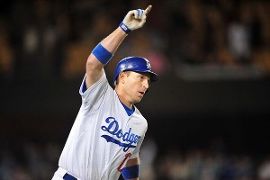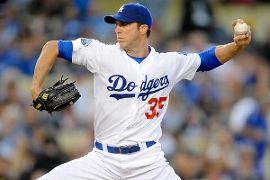|
When Los Angeles Dodgers starter Chris Capuano stares in for the sign from catcher A.J. Ellis and they decide whether to go with the fastball, changeup or curve, an additional, subconscious thought flashes across the 60 feet, 6 inches that separate them: In light of all the obstacles they've endured, they're fortunate to even be in the major leagues right now. Both are well-spoken, engaging and thoughtful college graduates. Capuano, valedictorian of his high school class in Massachusetts, has an economics degree from Duke University, where he was a Phi Beta Kappa. Ellis, who has a bachelor's in communications with a minor in creative writing from Austin Peay State University, joins George Sherrill and Shawn Kelley of Seattle and Matt Reynolds of Colorado as one of four former Governors players in the big leagues. Get beyond their curriculum vitae to the unspoken parts of their résumés, and you'll find that Capuano is an erstwhile medical train wreck and Ellis is a career minor league backup who spent four years at Triple-A before landing his big break. Both players are longer on perseverance than raw tools. But where would the Dodgers be without them? Matt Kemp's march to a National League MVP award has been stalled by a hamstring injury; Ted Lilly is out with a shoulder injury; and the Dodgers rank 14th in the NL with 41 homers. On the way to a major league-best 36-21 record, they've gotten welcome contributions from Aaron Harang, Josh Lindblom, Jerry Hairston Jr., Elian Herrera and Los Angeles Angels refugee Bobby Abreu, among others. But no one has surpassed expectations for manager Don Mattingly more than the team's surgically repaired lefty and terminally underappreciated catcher. Although Capuano has hit a speed bump in his past two starts, with back-to-back mediocre outings against the Rockies and Phillies, he's 8-2 with a 2.82 ERA and a .203 batting average against this season. He reeled off eight straight quality starts at one point and threw 24 2/3 straight scoreless innings in April and May while relying on a fastball that averages a tick under 88 mph. That's faster than the No. 1 thrown by Bruce Chen, Mark Buehrle and Barry Zito, but still ranks among the pokiest heaters in the majors. "Everybody knows what a smart guy Chris is,'' Ellis says. "He really studies and spends time in the video room breaking things down. But when he gets on the mound, he does a great job of pitching with a clear head. He doesn't overthink things. That can be a problem with more cerebral guys. He just gets the sign and goes.'' Ellis, a walking machine, ranks fourth in the majors with a .425 on-base percentage and has reached base safely in 43 of 45 games. He has thrown out 42.5 percent of opposing base stealers (17-of-40) and combined with backup catcher Matt Treanor to get the most out of a Dodgers staff that ranks second in the majors with a 3.26 ERA combined. "I felt comfortable with him very quickly in the spring,'' Capuano says of Ellis. "He went out of his way to ask questions and catch my bullpens and learn what I like to throw and what my strengths are. He does more scouting of hitters than any catcher I've played with. I can just relax and execute pitches, knowing he has a good idea of our game plan.'' Cheap signEllis, 31, is a native of Cape Girardeau, Mo., the birthplace of Rush Limbaugh. In 1912, his great-grandmother was scheduled to emigrate from Eastern Europe to America for an arranged marriage but arrived too late to catch the passenger liner across the Atlantic. That turned out to be a good thing, since the vessel in question was the Titanic. She later caught another ship and made it to Indiana for the wedding.  After setting a school record with 263 hits at Austin Peay, Ellis received a $2,500 bonus from the Dodgers in the 18th round of the 2003 draft. "Grocery money,'' he calls it. He figured it might be neat to spend two or three years in the minors and have professional baseball on his résumé before moving on to a career as a teacher and coach. But Ellis gradually found a niche as a reliable backup catcher. During his 2004 season in Vero Beach, Fla., top prospect Russell Martin started four of every five games behind the plate and Ellis caught hotshot pitcher Chad Billingsley every fifth day. He laughs when recalling a conversation he once had with former Vero Beach manager Scott Little. "He asked me, 'Why do you think you're catching Chad?''' Ellis says. "I said, 'Because you want me to mentor him and shepherd him.' And he said, 'No, you're catching Chad because when he's pitching, we don't need much offense and I don't need Russell to play.''' Ellis thought his career was on the move when he hit .346 in the Arizona Fall League in 2006. But the next season in Double-A ball, he glanced up at the scoreboard in Knoxville, Tenn., and saw a big fat .160 batting average staring back at him. When his manager, John Shoemaker, summoned him to his office, Ellis thought he was about to be demoted or released. Instead, Shoemaker told Ellis he was pressing and ordered him to refrain from all baseball-related activities for two days to clear his head. Ellis had permission to shag fly balls and watch games from the dugout and nothing more. He emerged from his hiatus with a fresh, new mindset. "I was back in the lineup the third day, and it wasn't a job or a grind anymore,'' Ellis says. "I was excited to play. That moment made me realize that baseball is supposed to be fun. It's supposed to be a game. And when you try to take control of things you have no control over, you're done.'' In parts of nine minor league seasons, Ellis racked up more walks (336) than strikeouts (283) and logged an impressive .406 on-base percentage. But he had to fight for every scrap. When the Dodgers sent him to the minors last year because he still had options and wouldn't have to clear waivers, his frustration boiled over and he expressed his displeasure to the manager. "He felt like he was ready,'' Mattingly says. "He was pissed, to be honest. He said, 'You're sending the wrong guy out.' "I like the fact that he stood up for himself. A.J. has always been the kind of guy who'll take it and do the right thing and say the right thing, but it was like he said, 'I've had enough. I can play here.' He's hard to sell short, because he goes to great lengths to be good.'' Ellis learned a lot about catching from former teammate Brad Ausmus during the 2009 and 2010 seasons and improved his offense through countless hours in the batting cage with former Dodgers coach Jeff Pentland. Three years ago, Mattingly recalls, Ellis could barely hit the ball over the fence in batting practice. This year he has six homers and a .487 slugging percentage.
Medical marvelIn contrast to Ellis, Capuano was an accomplished big leaguer by age 25. He went 18-12 for the Milwaukee Brewers in 2005 and made the All-Star team the following year before going on a Chad Fox-caliber medical odyssey. Capuano endured two Tommy John surgeries, a surgery on his right (non-throwing) shoulder and a torn labrum in his hip.  Two springs ago, Capuano suffered a setback and stayed behind in Arizona when the Brewers broke camp. Rather than lament his fate, he stepped back, took stock of his life and gave himself an attitude adjustment. When he accepted the possibility that his arm might never fully recover, it was almost liberating. "It was like a weight off my shoulders,'' Capuano says. "Since then I've had a much different perspective on my baseball life, and a healthier one. I realized, 'Hey, this could end tomorrow, and I'm OK with that. I have a great family, I love my wife and I'll have other opportunities. I'll be OK without baseball.' It makes me appreciate every day that I have here.'' Capuano regained much of his arm strength in 2010 with the help of former Milwaukee pitching coach Rick Peterson's long-toss regimen, and he parlayed his 11-12 record and 186 innings with the Mets last season into a two-year, $10 million, free-agent contract with the Dodgers. His changeup has always been a weapon, and he has benefited from the addition of a cut fastball to his repertoire and a new curveball grip that he picked up from minor league coach Glenn Dishman in spring training. Regardless of his velocity, Capuano has never lacked for resourcefulness.. "He's a tough guy to scout,'' Mattingly says, "because he gives you so many different looks.'' Capuano gave up three home runs to the Phillies on the way to his eighth victory of the season Wednesday. But at this stage of his career, he's not about to get flustered by a so-so night at the park. Two elbow reconstructions have a way of changing a man's thinking. "I don't look back and think, 'Boy, if I didn't have the injuries, I could have been this or that,''' Capuano says. "I'm almost thankful I had them. As a player and a person, I feel like I'm in such a better place now. I'm more confident, and I don't sweat the stuff I used to. I didn't think baseball could be this much fun. It's been amazing.'' Capuano maintains a firm grip on that sentiment with every 86 mph fastball he throws. And if he ever forgets how lucky he is to be pitching for a contender, the presence of Ellis throwing down signs jogs him back to reality. They're just two baseball survivors, drawing strength from each other as a long-lasting battery.
|

